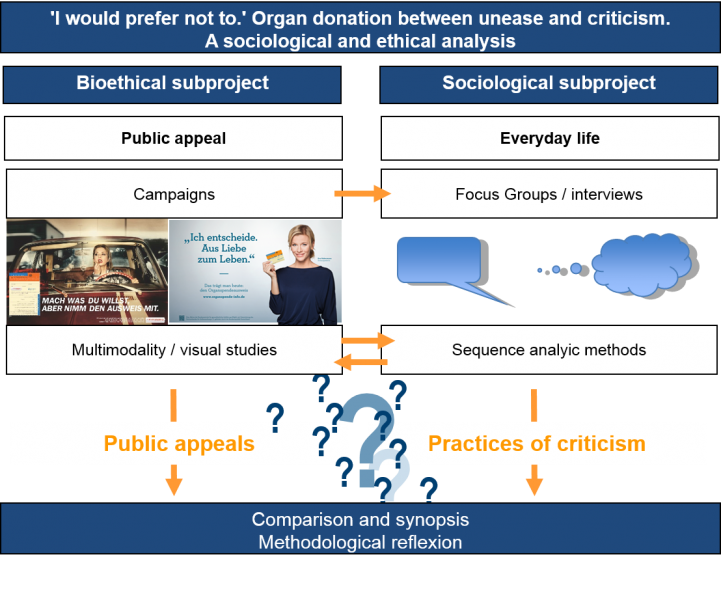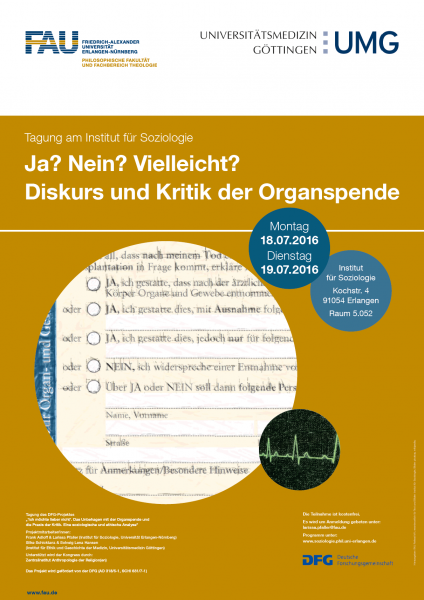'I would prefer not to'
'I would prefer not to'
Organ donation between unease and criticism. A sociological and ethical analysis.
News:
Video documentation of the conference "Yes? No? Maybe? Discourse and criticism of organ donation"
Einstellung zur Organspende: Kulturell tief verwurzelt - Deutsches Ärzteblatt 2016; 113(37)
Press release FAU
"Muss sich schämen, wer seine Niere nicht hergeben will?" - Zeit Online, 05.August 2016
The project:
In Germany, post mortem organ transplantation not only depends on the explicit consent of the donor in an actual case, but is also subject to the acceptance amongst the general public. At the same time, among the German population there is a significant discrepancy between expressed positive attitudes towards organ donation and active willingness to donate one’s organs after diagnosed brain death, for example documented by filling in a donor card. Thus, ‘organ shortage’ – the gap between transplantable organs and the number of patients on the waiting list for organ donation – is commonly reduced to a lack of willingness to donate. Thus, (new) legal regulations and public campaigns aim to increase the willingness to donate among the general public by providing information. Although campaigns present the attitude towards organ donation as being up to an individual decision, they seem to be biased as they only show moral arguments in favor of organ donation like altruism, responsibility, or social conformity. As the reluctance to donate is only seen as a factor to be overcome, in-depth studies on reasons for reluctance are missing. The project aims for a better understanding and differentiated characterization of those who are uncertain or reluctant regarding organ donation. We combine a sociological and ethical approach and ask what kinds of scepticism about organ donation are expressed and enacted as well as whether they represent morally consistent positions. We also focus on the conflict between the social marketing on organ donation and its addressees. We conduct interviews and focus groups with citizens concerning their potential involvement in post-mortem organ donation that also address, among other things, uncertainties, disappointments, fears and vulnerability (sociological subproject). Furthermore, we analyze various German poster and informational campaigns that were carried out in the last 20 years by using approaches of multimodality and visual studies. Here, it is of interest whether these campaigns maintain a both morally and politically consistent image or whether they produce morally relevant discrepancies (bioethical subproject). We assume that uncertainty and refusal may have ‘good’, albeit implicit or emotional reasons. By linking both subprojects, we expect both scientifically and socio-politically relevant results. Not only do we aim to receive new empirical insights on the social ambivalences of organ donation, but also, through the bioethical analysis of public moral encouragement and further development of socio-theoretical and normative approaches, to provide a contribution to the reflection of the social significance of transplantation medicine.

Publications:
Schicktanz, Silke / Pfaller, Larissa / Hansen, Solveig Lena / Boos, Moritz (2017): Attitudes towards brain death and conceptions of the body in relation to willingness or reluctance to donate: Results of a student survey before and after the German transplantation scandals and legal changes. In: Journal of Public Health. http://link.springer.com/article/10.1007/s10389-017-0786-3
Schicktanz Silke / Wöhlke, Sabine (2017): The Utterable and Unutterable Anthropological Meaning of the Body in the Context of Organ Transplantation. Dilemata, 9, 23, 107-127.
Schicktanz, Silke / Wöhlke, Sabine (2017): Leben im Anderen. Vorstellungen zur Personalitätsübertragung zwischen kulturell Sagbarem und Unsagbarem. In: H. Knoblauch et al. (Hg.): Transmortalität und Organspende. Weinheim, 75-105.
Schicktanz, Silke / Pfaller, Larissa / Hansen, Solveig Lena (2016): Einstellungen zur Organspende. Kulturell tief verwurzelt. In: Deutsches Ärzteblatt, 113 Jg., H. 37, S. A1586-A1588.
Böhrer, Annerose / Wunder, Angelika (2016): Ja? Nein? Vielleicht? Diskurs und Kritik der Organspende. In: Diatra - Zeitschrift für Nephrologie, Transplantation und Diabetologie, H. 4-2016, S. 48-50.
Hansen, Solveig Lena / Schicktanz, Silke (im Erscheinen): Bilder fürs Leben: Versteckte moralische Botschaften als Reaktion auf die Krise der Organspende. In: A. Esser et al. (Hg.): Die Krise der Organspende – Anspruch, Analyse und Kritik aktueller Aufklärungsbemühungen im Kontext der postmortalen Organspende in Deutschland. Berlin.
Adloff, Frank / Pfaller, Larissa (im Druck): Critique in statu nascendi? The Reluctance towards Organ Donation. In: Historical Social Research, special issue “Critique and Social Change”
Presentations:
Hansen, Solveig Lena / Böhrer, Annerose (2016): Organtransplantation in Deutschland. Ein Überblick über Kampagnen, ihre Wirkweisen und ethische Relevanz. IPPNW-Studierendentreffen, 12.11.2016, Hannover.
Hansen, Solveig Lena / Pfaller, Larissa (2016): “Als wäre es völlig normal oder einfach“ – Wirkmechanismen moralischer Botschaften deutscher Organspende-Kampagnen. In: 25. Jahrestagung der Deutschen Transplantationsgesellschaft, 05.-08.10.2016, Essen.
Schicktanz, Silke / Pfaller, Larissa / Hansen, Solveig Lena (2016): Ergebnisse einer quantitativen Umfrage unter Göttinger Studierenden vor und nach den Skandalen: Der Einfluss von Körperkonzepten und Einstellungen zum Hirntod auf die Spendebereitschaft. In: 25. Jahrestagung der Deutschen Transplantationsgesellschaft, 05.-08.10.2016, Essen.
Böhrer, Annerose / Pfaller, Larissa (2016): „Für mich ist es fast eine Grenzüberschreitung“. Zum Unbehagen mit der Organspende. In: Geschlossene Gesellschaften - 38. Kongress der Deutschen Gesellschaft für Soziologie, 26.-30.09.2016 2016, Bamberg.
Hansen, Solveig Lena / Schicktanz, Silke / Pfaller, Larissa (2016): Zwischen Information und Befürwortung Ethische Aspekte öffentlicher Gesundheitskommunikation am Beispiel der Organtransplantation (Poster-Präsentation). In: Jahrestagung der Akademie für Ethik in der Medizin, 22.-24.09.2016, Bielefeld.
Böhrer, Annerose (2016): Materielle Kultur medizinischer Netzwerke am Beispiel Organspende, In: FIW Summer School 2016, Bridging the Gap: Soziologische Theorie und empirische Forschung, 06.-09.09.2016, Bonn.
Pfaller, Larissa / Hansen, Solveig Lena (2016): Warum das Nein zur Organspende so schwer fällt. In: Ja? Nein? Vielleicht? Diskurs und Kritik der Organspende. 18.-19.07.2016, Erlangen.
Böhrer, Annerose (2016): "Mein Ausweis, meine Entscheidung"? – Eine objektsoziologische Spurensuche im Organspendediskurs (Posterpräsentation), In: Ja? Nein? Vielleicht? Diskurs und Kritik der Organspende, 18.-19.07.2016, Erlangen.
Wunder, Angelika (2016): Wem möchte ich meine Organe spenden? (Posterpräsentation),, In: Ja? Nein? Vielleicht? Diskurs und Kritik der Organspende, 18.-19.07.2016, Erlangen.
Hansen, Solveig, Lena / Schicktanz, Silke (2016): Face-to-face?! Zur moralischen Relevanz und sozialen Funktion visueller Botschaften in der Transplantationsmedizin, In: Nach der Hybridität. Medien und Politiken der Transplantationen, 23.-25.06.2016, Gießen.
Hansen, Solveig, Lena / Schicktanz, Silke (2016): No space for rejection?! The moral relevance of campaigns in the discourse of organ transplantation (Posterpräsentation), In: World Congress of Bioethics, 14.-17.06.2016, Edinburgh.
Schicktanz, Silke / Hansen, Solveig Lena: A critical reflection on moral claims and invocations of public campaigns for organ donation – Discrepancies, potential conflicts, and practical limitations, In: Workshop ELPAT-Working Group: “Public Issues”, 06.-08.05.2016, Granada.
Hansen, Solveig Lena / Pfaller, Larissa (2016): Depicting Moral Messages – an Analysis of German Poster Campaigns on Organ Transplantation. In: 4th ELPAT Congress. Ethical, Legal and Psychological Aspects or Transplantation. Global Challenges, 22.-25.04.2016, Rom.
Pfaller, Larissa / Schicktanz, Silke / Hansen, Solveig Lena (2016): Increased Organ Donation Willingness after German Transplantation Scandals. The Influence of public Attitudes towards Brain-death and Concepts of the Body. In: 4th ELPAT Congress. Ethical, Legal and Psychological Aspects or Transplantation. Global Challenges, 22.-25.04.2016, Rom.
Pfaller, Larissa / Hansen, Solveig Lena (2016): Rejecting Organ Donation – A Typology of Reluctance (Poster-Präsentation). In: 4th ELPAT Congress. Ethical, Legal and Psychological Aspects or Transplantation. Global Challenges, 22.-25.04.2016, Rom.
Schicktanz, Silke (2015): Moralische Appelle, Kampagnen und öffentliche Information zur Organspende: eine kritische Zwischenstandsanalyse, In: 27. Medizin-Theologie-Symposium der Evangelischen Akademie Tutzing: „...als wär`s ein Teil von mir...“ Zur Debatte um Hirntod, Organspende und Transplantation, 27.–29.11.2015, Rothenburg.
Hansen, Solveig Lena (2015): Pictures for Life. Analyzing the Moral Iconography of the German Organ Transplantation Foundation, In: International Workshop: ‘TO WHOM IT MAY CONCERN…’ Methodological and Ethical Perspectives of Visual Health Communication. Department of Medical Ethics and the History of Medicine, 07.10.2015, Göttingen.
Pfaller, Larissa / Hansen, Solveig Lena (2015): Projektvorstellung: „Ich möchte lieber nicht“, Workshop: Die Kritik an der Organspende, 31.03.2015, Erlangen.
Hansen, Solveig Lena / Pfaller, Larissa (2015): Soziologische und ethische Fragen an das Unbehagen mit der Organspende: Ein interdisziplinäres Projekt zur Praxis der Kritik. In: „Organspende und Transmortalität: Die Perspektive der Medical Humanities“, 20.03.2015, Aachen.
Schicktanz, Silke (2015): Finanzielle Anreize für die Organspende? Empirisch-ethische Überlegungen, Institut für Psychosomatik, Kolloquium, 12.01.2015, Charité Berlin.
Schicktanz, Silke (2014): Why giving organs? Empirical and ethical insights on altruism, incentives, and reciprocity, Bioethik-Kolloquium, 16.12.2014, Universitätsmedizin Innsbruck.
Workshops and Conferences: (posters and programmes: here)
Hansen, Solveig Lena: Reihe „Situiertes Wissen – Theorie, Methodologie, Empirie“. Workshop: „Forschen im und über das Netz“, mit Dr. Christoph Bareither (Tübingen): online.feld.forschen. Ethnografische Analysen durch das Medium Internet. 23./24.01.2017, Göttingen.
Adloff, Frank / Pfaller, Larissa / Schicktanz, Silke / Hansen, Solveig Lena: „Ja? Nein? Vielleicht? Diskurs und Kritik der Organspende“. Interdisziplinäre Abschlusstagung, 18.-19.07.2016, Erlangen.
Adloff, Frank / Pfaller, Larissa / Schicktanz, Silke / Hansen, Solveig Lena: Podiumsdiskussion „Organspende zwischen Aufklärung und Reklame – Ein Gespräch über Kampagnen, Medien und Kritik“, Moderation: S. Schicktanz, 18.07.2016, Erlangen.
Hansen, Solveig Lena: Reihe „Situiertes Wissen – Theorie, Methodologie, Empirie“. Workshop: „Analysen visueller Narrative in der Geschlechterforschung - praktische Anwendung und theoretische Reflexion?“ mit Prof. Dr. Elke Grittmann (Lüneburg), 30.6./1.7.2016, Göttingen.
Hansen, Solveig Lena / Schicktanz, Silke: ‘TO WHOM IT MAY CONCERN…’ Methodological and Ethical Perspectives of Visual Health Communication. International Workshop, 07.10.2015, Göttingen.
Pfaller, Larissa / Hansen, Solveig Lena: „Die Kritik an der Organspende", 31.03.2015, Erlangen.
Schicktanz, Silke / Pfaller Larissa: „Frauen geben, Männer nehmen?“ Genderaspekte in der Organtransplantation – empirische, theoretische und normative Fragen. Gefördert durch das Büro für Gender und Diversity der FAU – „Förderung der Chancengleichheit für Frauen in Forschung und Lehre“ (FFL), 31.01.2014, Erlangen.
Erlangen:
Dr. Larissa Pfaller,
Prof. Dr. Frank Adloff
Göttingen:
Prof. Dr. Silke Schicktanz,
Dr. Solveig Lena Hansen
Conference "Yes? No? Maybe? Discourse and criticism of organ donation"
July, 18th and 19th in Erlangen
In Germany, organ transplantation is understood as an integral part of modern medicine. At the same time, social and ethical aspects are contentiously discussed due to recent events. In public discourse, donating organs is seen as an altruistic and supererogatory act. Therefore, reluctance to donate or skepticism are only seen as factors to be overcome in favor for increasing the willingness to donate amongst the general public. However, the motives and beliefs behind such reluctant attitudes of organ donation are mostly unexplored in Germany.
Our project focuses on the reluctance regarding organ donation as well as the moral messages of public campaigns initiated by German health organizations. The conference will present the project results and bring them up for discussion with different perspectives on the cultural basics for reluctance, skepticism, and criticism. Further, the conference examines topics the current practice of organ donation in Germany, conflicting goals in educational work, and cultural imaginations of donation and corporeality.

You are warmly invited!
Registration at: Larissa [dot] pfaller [at] fau [dot] de
The program and general information about the public panel discussion 'Organ donation between information and advertisement – A discussion about campaigns, media, and criticism' on July, 18th 2016 is ready for download at the bottom of this page.
| Anhang | Größe |
|---|---|
| tagungsprogramm.pdf | 3.31 MB |
| poster_tagung.pdf | 2.54 MB |
| poster_podiumsdiskussion.pdf | 3.35 MB |



